#so. something something validation and being perceived more positively by other people than it feels like
Explore tagged Tumblr posts
Text
Quick reminder for all of us low self-esteem havers that we’re easier to love than we think
#I don’t necessarily mean romantically either#but I was thinking about this bc I’ve been dreading asking for letters of rec#and put it off until the last minute bc I was so mortified of asking for something or being a burden#and to my surprise everyone said yes even w such short notice#I emailed one of them like ‘here’s a copy of my resume if you get stuck!’#and she replied something along the lines of ‘it’s easy to write a letter of rec for you’#so. something something validation and being perceived more positively by other people than it feels like#tracking tag#rambling
20 notes
·
View notes
Text
Mostly I was responding to the points raised in @scarrletmoon's response, but you raise some excellent points to which I'd like to respond. Feel free to ignore if you're tired of my bullshit. I completely understand the impulse. 1st, you're absolutely right; I was coming across as gate-keepery by saying that I find Stede's eccentricities charming as though that ought be the default experience. For that I apologize. I ought to have taken more care. When I said "And that's valid, but I would say that those are the parts that the crew and Ed grow to love once they embrace those parts of him instead of cringing at them" what I meant to convey is that the experience of 2nd-hand embarrassment when Stede does something that recalls to the viewer times when they have felt ashamed/were made to feel shame because of something they did is absolutely understandable, but we can take heart in Stede being accepted & loved for those parts of him, & find hope that so too may we be embraced for our own quirks & foibles. My intention was to encourage others to be more gentle with & accepting of their own perceived failings, but I can see now that I failed to adequately express that, & for that I am sorry. I do take issue with the suggestion that I am strawmanning, though; I would argue that how one views Stede's motivation & framing absolutely informs the extent to which/moments in which one finds his behavior cringe-worthy. In your original post, you contend Stede is "pretending to be this macho pirate captain who totally knows what he's doing" & your response above adds he's a bad manager & a jerk because he's praising himself & chiding his employees, whom you interpret as him treating as stand-ins for his own children. If that's how you're framing the scenario, then, sure - I can see how his behavior comes across as cringe to you. But that's not at all how I perceived it. I will grant he is pretending more expertise than he actually possesses, but he IS a pirate captain, & as to the attribution of "macho" I absolutely disagree, specifically because he is textually interested in a form of piracy that is not that. Because that is my understanding of the scene, in the debrief scene I see a person excited at the success of what, if Black Pete is to be believed, is their very 1st raid, & doesn't understand why everyone else wasn't also chuffed. He then listens to Wee John' criticism & encourages him to clarify WHY he feels the way he does. When Wee John identifies the lack of a flag as a contributing factor to his disgruntlement, Stede provides materials so they can rectify the deficit. This isn't Stede forcing arts & crafts on these grown-ass men (& Jim) - it's Stede hearing a problem & supplying the means to a solution. Similarly, he hears out Buttons about the crew's dissatisfaction, & tries to rectify it by finding a more appealing target for a raid, even though he obviously feels unequal to the task himself. To me, that's the complete opposite of a bad manager (to me he's a bad manager when he's being dismissive of the crew's input, like the fuckery brainstorming, & even then he climbs down from his high horse & apologizes. Which? GREAT manager!). Where you see Stede infantilizing his crew, I see them taking part in activities that, while generally relegated to childhood, aren't implicitly childish, & of their own volition, & Stede sowing the seeds that will eventually blossom into a found family (not imposing an established family structure). For clarity, I'm not saying my interpretation is objectively right, nor that yours is wrong. I'm just saying framing is going to influence perception of whether Stede's behavior is Cringe, & that's kind of what I was getting at with my myriad examples of Stede behaving "authentically" or "inauthentically" & when that is a viable predictor of a general fandom perception of when Stede is being Cringe. Because I really don't think it is. This is going to continue in the notes because tumlr thinks they can cut my mic.
listen I love stede a lot - I think he's the bravest character in the show. he changes everyone he meets for the better. he embodies what I think of as the thesis of the show. if he wasn't the way that he is, the show would not be very good, imo.
but in ep one he gives his pirate crew notes on the raid they just did as though they were a community theater troupe and his notes were 1) complimenting his own opening speech as "very inspiring" and 2) complaining that that the crew wasn't sufficiently enthusiastic about robbing two poor fisherman of a single plant.
during the raid his narration went "some men are born to be pirate captains, others learn on the job. me? well I'm a pretty solid mix of both" as though he has any idea what he's doing.
and AFTER the raid Olu has to gently point out to him that piracy isn't a game to the rest of the crew.
There's a reason that Rhys Darby was the only person capable of playing Stede without making him seem like a total dick. And I think that's bc Rhys was able to convey the idea that Stede's behavior in the first few eps is coming out of this deep sense of insecurity - he's doing some Stede-y things (flag making! paying the crew! bedtime stories!) that are great but he's also pretending to be this macho pirate captain who totally knows what he's doing. And it's the pretending that makes people cringe with second hand embarrassment. While also, often, seeing themselves in it and feeling a great deal of sympathy for Stede about it.
The reason Stede is like this is because HE thinks there's something deeply wrong with him, a belief that has been solidified by everyone around him his entire life, and therefore he needs to do everything he can to hide that deeply wrong thing about him. When he unpacks that and embraces the things about himself he originally thought were embarrassing (being weak, pathetic, soft, etc), he can stop pretending. And that's when other characters grow to love him! And so people will sometimes call him cringe because they aspire to be cringe like him, to embrace the parts of themselves that they were punished for and live more authentically.
because he changes! that's the point! he moves from cringe (pretending to be someone he's not) to cringe (being true to himself, always a deeply vulnerable thing to be) and it takes a lot of hard work. that's what makes me LIKE him as a character. that's what I think makes him the bravest character on the show. because he doesn't start out perfect. he's a puppet who grows into a real boy and that means that for a period of time he was a puppet, and that's okay.
#In your posts you say 'it's the pretending that makes people cringe with second hand embarrassment' & ''cringe' comes from when#you are trying to pass yourself off as something you’re not *& failing*.' I really can't say I agree. This is what I was trying to get at#when I was talking about the battle robe scene. Stede is pretending bravado when he calls the garment he put on to comfort himself#a 'battle robe' and when he asks for a 'refresher' on defensive maneuvers but no one is fooled by this affectation - not the audience & not#Jim & Olu. But this isn't the part of the scene that's Cringe even though Stede is pretending to be brave & failing badly.#The part that's Cringe is when he tries to claim affiliation with a group to which he doesn't belong & puts Olu in the position of having t#nicely explain why he's wrong. It's not the pretending that's Cringe it's the unexamined privilege & putting someone in an awkward position#I would argue that Cringe comes from the sympathetic recognition that someone is doing something they shouldn't & how you would feel#if you were in their place. I would like to share one of the times I find Ed Cringe that I don't normally see discussed in those terms#in fandom at large; the montage part of the French Party Boat scene when Ed is clowning around. I find this scene hard to watch because I#am intimate with the scenario of thinking you're among friends & being encouraged to act out only to find out later they were only feigning#friendliness & were laughing at rather than with you - with the shame of realizing you erroneously let yourself believe you were liked &#lending credence to the idea that you're *deserving* of derision by people who already held you in contempt by making a fool of yourself.#Again - not saying mine is the correct interpretation of this scene - just explaining how I perceived it.#Because my point is not that Ed *IS* Cringe in this moment but that we should all examine WHY we find a character's behavior Cringe.#WHAT about that scenario invokes that reaction? What messages have we internalized about Correct Social Behavior that is prompting it?#Are those messages valid? Are they something we want to continue to reinforce or would we be happier if we let them go?#This is what I meant when I said we should be cautious about trying to jam all the iterations of Cringe under a single umbrella term.#& why I think it's not useful to reclaim Cringe as an unambiguously positive term.#Because there ARE times when that Cringe response is identifying an actual social transgression.#I'd never say Stede is *never* Cringe 'cos there are times when he absolutely is. Like the 'one of the guys' part of the battle robe scene#When he says he's not a colonizer before the tribal council. Other times? That's more fungible.#& is going to depend a lot on the person perceiving the Cringe behavior & their own internalized deal.#If someone says 'Stede is Cringe & I love him' & means 'I love that he's unapologetically himself & loved for it & wish I was less worried#about what people think so I could be free to express myself like him' that's beautiful & I wish them luck & every happiness.#If what they mean is 'Stede gives zero fucks & has no filters & we should all be more like that' that's not just objectively untrue#it's also not how social contracts work. SOME filters are GOOD. Being aware of which ones you've internalized#& whether they're useful for you or holding you back is also good.#If what they mean as I've unfortunately seen all too often & makes me suspicious when I someone use Cringe as a blanket descriptor of Stede#is 'Look at that buffoon go. What a loser.' Meet me in the Denny's parking lot. I just want to talk. And keep some gates.
342 notes
·
View notes
Text
Why I don't really like the 12th house. / observations
How I perceive the 12th house, my real life observations on it and why I don’t really like it

TW : mention of anx!ety, d€pressi0n, self-und0ing attempt, mental he@lth issu€s, pan!c att@cks
(Sorry in advance for the constant cens0r!ng, I don't want to run the risk of getting shadowbanned like it almost happened before)
In december and january of 2023/2024 I was having 12th house transits (Mars then Venus). This is what I wrote on my notes app about the negative experience I had :
I am currently having 12th house transits at the time (Mars then Venus) and I've been so much sleepier and prone to irrational, unexplainable stress. Like I wake up and I am still tired bruhh I hate it as a Mars Dom I usually instantly and really easily wake up in the morning so it's frustrating because I feel less productive and sloppier and daydreamy but in a bad way.

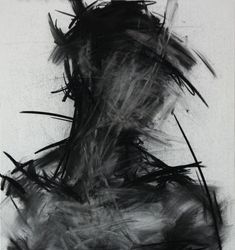
Why I don't really like the 12th house...
I genuinely don't understand the "hype" (if we can even use that word) around the 12th house. When I first got into astrology, I saw so many posts about it saying how magical it was, how special it is to have placements in this house, how it means that you have a higher purpose than others, how you are so sensitive, an empath...And I have to say, yes, of course, some of it is true. However, it is clearly a more romantisized description of the 12th house. This idea of a romantisized version of the house was then overtime validated by the fact that every single person that I've met with 12th house placements/stelliums were far from living this almost fantasy like description. In fact, these positive traits seem to be rarely easily expressed for people who haven't studied astrolgy to get to know themselves better and understand their purpose. The people that I know with these placements were mostly d€pressed, too nice, had anx!ety attacks, insomn!as , and sleepless nights. It is honestly such a lonely house. Having these placements in the capitalistic utilitarist world we live in is sadly more of a curse than a blessing...
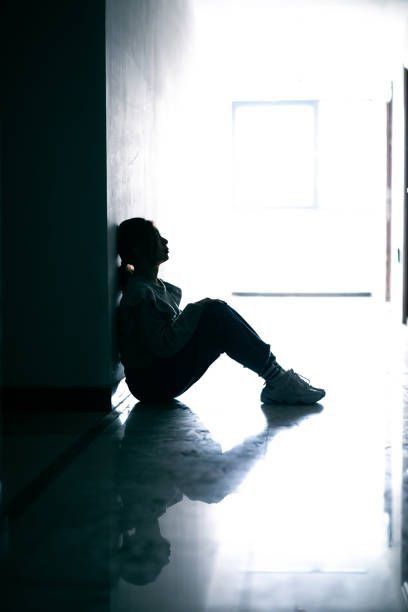
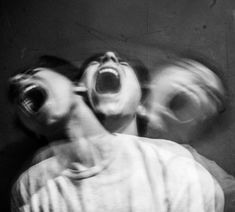
People I know with 12th house stelliums/ placements
• One of my friends has a 12th house stellium, her Sun in Taurus, Moon in Gemini and Mercury in Aries being there (the sign of the house is aries). She also has an Aries North node in the 12th house.
She always felt overstimulated and often told me that sometimes she didn't know if what she was thinking was really her own thoughts or other people's. She also had this obsession, or more so obsessive fear, with the idea of having to/ being forced to "sacrif!ce herself" for other people, for a job, for school,.. We often discussed this fear of hers and she would tell me this "why do people think we necesseraly have to suffer in life ? Why is struggle and suffering so normalised ? I don't want to sacrifice myself to achieve something, i don't want to purposefully inflect myself pain to live ? This is so weird to think that suffering is inevitable if you want to survive or live. That it's a normal part of life and that we should all be agreeing with it"
She is really empathetic and sweet but sometimes becomes all of a sudden defensive and passive-aggressive. She is also often anx!ous and as a result doesn't eat or sleep correctly.

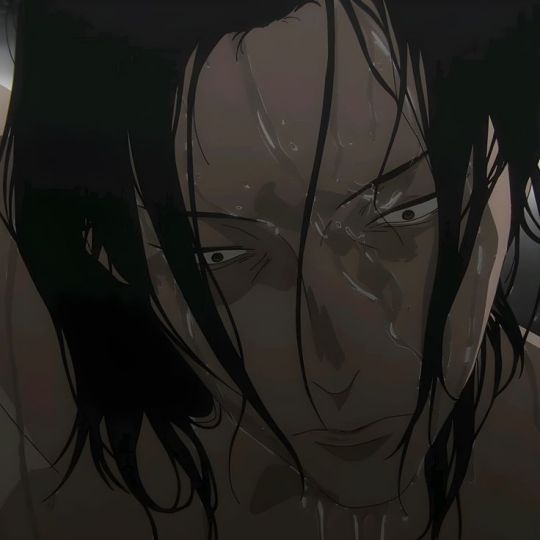
Another one of my high school friends, less close, has a 12th house stellium in Aries (Sun, Moon, Mercury and Venus). He also has a North node in Aries in the 12th house.
Because I am/was not really as close with him as i am with the previous friend, i can moslty only share my impressions and assumptions from the interactions i had with him. I think it's interesting to say that his energy really stood out to me. He had sleepy eyes and a melancolic aura that reminded me of 19th century poets. If you know about Arthur Rimbaud, there's this one picture where he seems to look away. He basically looked like he was permanently captured by an old antique camera. His energy felt like what sepia looks like if that makes sense. He also had green or blue eyes (i don't exactly remember) that emphasazied the impression that he was mourning for something permanently. They were wondering, pensive almost sorrowful.
He was really gentle with people. His friends often said he was like a teddy bear, despite being almost 2meters tall. It's interesting to point out too that he was a gym bro. I think he would go to the gym probably 6 times a week sometimes, yet was so nice and calm. He wasn't acting like a cringy alpha male, which is pretty surprising for a cis heterosexual gym bro man with an Aries Sun, stellium and North node.
I think part of it is the 12th house influence that toned down this energy a bit, and instead of being selfish like a regualr aries, he was more selfless. He was always respectful towards women and never shamed people. However, he had a lot of insecurities and felt kind of helpless regarding fixing certain problems in his life. He was sometimes a bit too passive, and wasn't too comfortable when met with conflicting energies or situations that required decisive reactions.

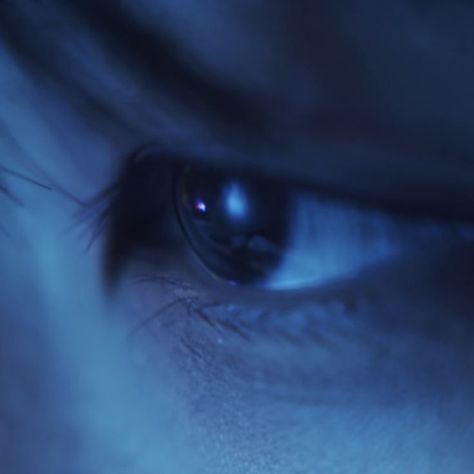
My sister has Lilith in the 12th house and her subconscious thought processes can become easily extremely s€lf destructive. She was diagnosed with severe depr€ssion and had to go to the mental h0spital once after doing a self-vndo!ng attempt. When her symptoms were still intense and she was still struggling a lot, she had to go to see a psychiatr!st and a therap!st on a weekly basis. It was a scary and crazy time. Until this day, she still has terrible sleeping patterns, many ins0mn!as, and often has pan!c att@cks. I distinctively remember one time it was so intense I thought she really was going to pass aw@y. She also used to have (and still a little) a huge victim complex, where she felt like she was condamned and doomed to live a miserable life, and that she is deeply misunderstood.


What drove me to come on here is a new student that I have met in college this year. We instantly clicked then she told me she was an Aquarius with an Aquarius rising and a Sagittarius moon. 3 of her personal planets fall in the 12th house, which means that, just like the two friends I have mentioned, she has a stellium. She then went on to explain to me how she was diagnosed with an anx!ety dis0rd€r. She said that she used to have, at some point, three pretty intense panic attacks on a daily basis. She told me that when she saw a therap!st for an appointment, the th€rap!st was shocked and said that it was probably one of the worst cases she has ever dealt with (update 21/10/24 : she actually didn't say that it was one of the worst cases of her career, she was just genuinely shocked at how my friend was able to survive living like this for such a long time).
This made me realize that there is definitely a theme with the 12th house surrounding chaotic sleeping patterns, restlessness, overthinking, numbness, emptiness, hightened anx!ety, melancolic tendancies, s€lf-sacrif¡ce and depr€ssi0n.
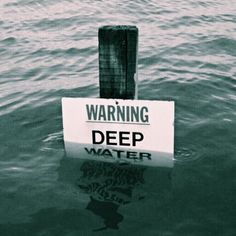

All of that to say that this house is somehow terrifying to me. I get the fascination for it. I just find it too eerie in a way. My chart, despite being a Sagittarius rising, is filled with fixed and cardinal signs. Pluto is prominent in my chart as it is thigtly conjunct my ascendant, so I don't behave and move through life like a stereotypical Sagittarius rising. On top of that, I have an 8th house stellium in Leo... I need to have control over things and situations, my ego is strong (i am working on it lol) and it is hard for me to surrender.
Therefore, the hyper mutable energy of the 12th house, its uncertainty and blurriness, gives me "anx!ety" and unsettles me. I never know what a 12th houser really thinks and neither do they themselves in a way. My fixed *ss finds that so stress inducing. I like when things are made direct and clear, but nothing about this house is direct nor clear.

#astro notes#astro observations#astrology#astro community#pick a card#pick a card reading#pick a picture#pick a pile
185 notes
·
View notes
Text
Okay gang, I noticed something super intriguing in my recent weekend rewatch of Dead Boy Detectives!
In Episode 4 when the night nurse goes into Charles' mind there's a consistent detail in his memories that I haven't seen anyone point out: not all of Charles' five schoolmates throw stones at him when he's in the lake.
Two boys are positioned slightly off to the left side of the screen, watching and making no move to stop the others, but they do not directly harm Charles at any point.
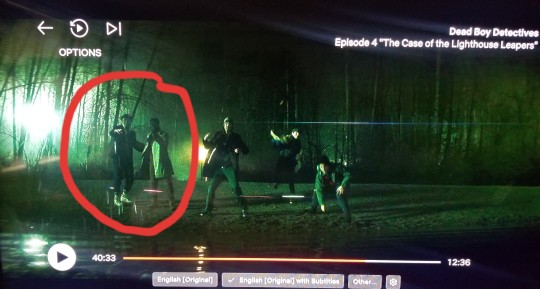
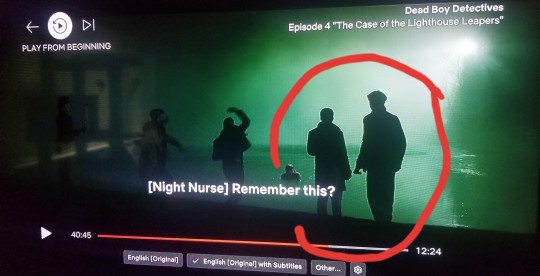
I know this doesn't seem particularly interesting in and of itself, but it quickly becomes more interesting when the Night Nurse asks Charles "What could possibly have made [his] friends turn on [him] like this," and we flash forward to the next memory, a visual response to her question. In this memory, we see Charles standing up to all of his so-called "friends" who are senselessly beating up on a boy from Pakistan and...
Wait - actually, no - not all of his friends...
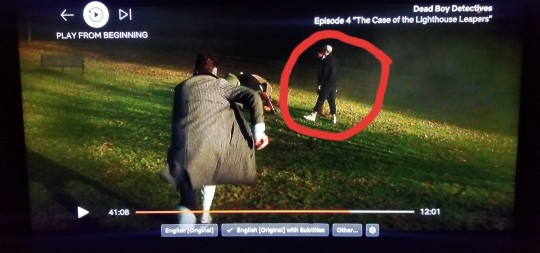
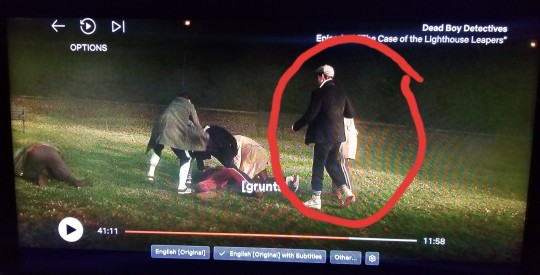
Yet again, two boys have been intentionally set apart from the group and yes, it is the same two boys who stood off to the side and watched Charles be harmed (ultimately killed) in the previous scene. The juxtaposition of these scenes begins to feel even more intentional when the perspective flips and we see the scene how Charles was seeing it, with the passive boys on the left and the boys engaging in violence on the right.
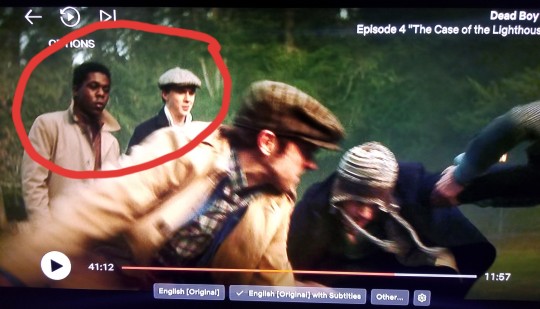
This scene is much brighter so we get a really good look at their faces here, but both of them go through a myriad of facial expressions/reactions in quick succession that are challenging to discern with 100% certainty. But with the blocking for the group being the same in both shots and the roles the boys play being the same in both shots, I feel like this had to be an intentional choice made to convey something implicitly to the audience.
That leaves me to wonder - did these boys know, deep down, that what was happening was wrong? Did they want to resist, walk away, or try to stop the violence like Charles did earlier but felt powerless to do so? It would be remiss of me not to acknowledge how one of the two "passive" boys was black: did that otherness, the same otherness that Charles felt and that boy from Pakistan surely felt, keep him from speaking up out of fear for his own safety (a valid fear, considering what we know).
Whatever the purpose, it's a really sad detail to me. Heartbreaking, actually. Edwin is 100% right when he says that the living are messy, and Crystal is right when she says that she and the boys lost their lives to boys who went too far (hers temporarily in the form of her memories, the boys completely in the form of their literal lives) because that's just it, isn't it? This show is full of moral and ethical conversations surrounding the limitations of labels like "good" and "bad" people; about capability and willingness to change; and about how our actions, whether rooted in good or bad intentions, can lead to unintended or undesired outcomes. Perhaps none of Charles' "friends" believed they would kill Charles that night; perhaps they just wanted to "rough him up" or "teach him a lesson." Perhaps none of Edwin's bullies could have anticipated that the ritual sacrifice "prank" would do anything more than scare a boy they perceived as different, effeminate ("Mary Ann"), and they certainly couldn't have known it would lead to years of torture and suffering in hell for not just Edwin, but for themselves as well. But it doesn't matter, and it doesn't excuse what they did. The boys who stood to the side and watched Charles die, and who watched their fellow "mates" beat on another boy prior to that, may not have thrown a single punch, but it didn't matter - the damage was done. They still were complicit in that violence, and therefore played just as much a role in Charles' death as the boys who were throwing stones and punches. To be alive is to deal with mess, complications, baggage...to insinuate otherwise is to diminish the nuance and intention put into every choice not only in this show, but in some ways, the world at large as well. It may be a small moment, but it struck me as something that said so much without having to explicitly say anything at all. Art is a good mirror on society in this way; it makes us face the reflections of messy, complex characters and situations that we could just as likely find ourselves a part of (maybe as the "good" guy, the vicim; maybe as the "bad" guy, the bully; or maybe as the guys who just... did nothing at all. The ones who watched, who were complicit in the suffering of others for what could be a multitude of selfish or self-preserving reasons).
All that being said, the TLDR here is: considering it's the same two boys who behave the same way in both instances it feels like an intentional detail. I wonder if there's potential for one (or both) of these boys to reappear in Charles' (after)life in the future? They are likely both still alive today, in their 50s, just as Charles would be had he not been murdered. Perhaps one of these boys could die and come to the agency with regrets or unfinished business (directly involving Charles or regarding something unrelated). Maybe Charles will run into them, alive, through a different case or just on the streets of London and be overwhelmed with a sense of "That should be me, too. I should have gotten to live." I imagine he would recognize them, even in older bodies, and it would understandably affect him to have to face anyone who played a role in his death, whether they threw stones or just watched.
Orrrrrrer it could be a totally pointless detail! 😂 I'm always open-minded to the fact that after 30+ rewatches I could be overanalyzing at this point. Either way, it confounds me nonetheless and I so desperately hope we will get to explore Charles' trauma more in season 2 (🤞)... so I thought I would share my thoughts! 🖤
(Last note: please excuse the bad photo quality!! I searched meticulously for the exact screencaps I needed but couldn't find anything, so I just took pictures of my tv screen with my phone lol.)
#dead boy detectives#dbda#charles rowland#edwin payne#crystal palace#dbda analysis#the dead boy detectives#the dead boy detective agency#the night nurse#I'm sorry this is so long I got emotional and needed to share#This show is so important to me I need a season 2 NOW
388 notes
·
View notes
Text
my suffering is profound and legitimate, yours is frivolous nonsense
Just reading a blogger I like but I had to laugh because she was talking about how beauty practices are bad for women's mental health, and she left a note saying "unlike gender affirming care! gender affirming care improves people's mental health and it's nothing at all like cosmetic practices."
TIL, when an older woman gets botox to remove her wrinkles and avoid facing the inevitability of decline and death, her problem is spiritual/structural and she needs to Do The Work to deprogram her ageism, unlike people with dysphoria, who of course have legitimate claims to cosmetic alteration.
And it is cosmetic - no part of the body that is altered by HRT or SRS or any of the feminization/masculinization surgeries is failing to function or functioning poorly. The problem is with the brain, which perceives the body parts as foreign or undesirable. We may sympathize with someone struggling with such a condition, but that does not change that the body parts being altered were already healthy and the alterations are cosmetic, and the relief being brought about is mental.
But plenty of trans people openly admit that separating body dysmorphia and gender dysphoria is a losing game. Contrapoints's video on "Beauty" (transcript) has the observation that she feels least dysphoric when she is meeting feminine beauty norms:
But I also think that trans people often talk like gender dysphoria is this intrinsic, personal experience that's always 100% valid and never has anything at all to do with the external pressure of beauty standards. But in fact, gender dysphoria is not sealed away in a vacuum away from the influence of societal ideals and norms. [...] When I try to psychoanalyze myself, I find that my desires to look female, to look feminine, and to look beautiful are not exactly the same, but they're woven together so tightly that it's kind of difficult to untangle them. And the opposite is also true, that for me feeling mannish or dysphoric usually goes along with feeling ugly. I don't have a lot of days where I walk out the house thinking "well, I'm giving femme queen realness, but apart from that I look like absolute shit".
Max Robinson's book "Detransition," from an FTM perspective, points out how the prospective trans man views his suffering as unique from and distinct from women's, even as the surgeries they seek are not especially different:
The stereotypical cosmetic surgery patient is seeking to become closer to being perfectly feminine - she wants to be beautiful. Transitional cosmetic surgery, on the other hand, is widely understood to mark the patient as ex-female and therefore unfemale; this is part of the meaning FTMs seek to create through surgery. FTM desire for cosmetic surgery is positioned as something totally different than the stereotype of a woman who 'merely' seeks beauty at her frivolous leisure. FTMs are deemed to have a rare affliction that needs urgent, life-saving treatment. Conversely, there is nothing more common than for a woman to become obsessed with her socially-deemed 'unsatisfactory' looks and desperately seek to change them, believing that such a change is the only thing that can restore her quality of life. This comparison will feel like an insult to the FTM. It will feel that way because we believe other women's suffering doesn't matter, and recognize how much ours does. Women's suffering is ordinary but ours is extraordinary. For us to matter, we must be differentiated from the silly little woman who wants to be pretty so badly she'll pay thousands of dollars (now billable to credit cards and loan programs designed to pay for elective surgeries!) to risk her life and health. These women don't need to be fixed; we do. FTMs know that we don't deserve a woman's fate but have not yet realized that no woman does.
I have more to write on the topic of the relationship between gender identity and beauty culture, but I'll end this one here. It makes sense that somebody who is identified with the opposite sex would also be affected by the standards of beauty expected of that sex. (Non-binary identification is more complicated and requires separate treatment.)
193 notes
·
View notes
Text
I know it's a bitter pill to swallow in this fandom for many reasons but, the phrase "open to interpretation" IS inherently a positive phrase that good creators use to affirm to their audiences that stories and art belong to the fans, and that every fan is able to find their own meaning through their own interpretive lens. It's not up to creators or actors to tell people what something--especially ambiguous or subtextual moments--mean. Everyone will come to a different understanding, some views might be more supported by canon than others, but it's still within every viewer's right to see things how they see them.
All "open to interpretation" means is: you get to interpret it! And you! And you! This is a key tenant of any creative work. It can be interpreted. And that is what literary analysis is all about. You build a case for your interpretation. You go into the text and find supporting evidence for your view, your thesis. And some interpretations are argued better than others. But everyone's still allowed to have their interpretation. (Also, literary analysis is fun).
I say all this because I've seen posts about Jensen going from "open to interpretation" to "clear text" as if he's now against the fact that things can and will be interpreted by fans. In terms of Cas's declaration of love? Yes, that is "clear text." It's romantic in nature, that's not up for debate, and Dean processed and understood it as romantic on the dungeon floor. But for stuff that is still ambiguous, still subtextual in some ways, like Dean's own feelings? Those are still open to interpretation by all sides, whether we like it or not. Until we get to see more of Dean and Cas's story in the basically guaranteed reboot, Jensen is not going to speculate about Dean's feelings or Destiel's reunion. He's never going to word-of-god confirm anything about this on stage at a convention. We have to wait to see it play out on screen.
As an actor, it's also not his place to confirm or deny these things. He leaves it up to the fans to read into his performance whatever they want. And yes, that sentiment IS affirming to a Destiel interpretation. We can read reciprocation into his performance. We can read romantic love into his words about Dean wishing he'd said "I love you back." We can look back on the years of queercoding and subtext and Jacting Joices and read Dean as being in love with Cas for years. And, well, the other side can read what they want into it, and we don't need to care what they think, tbqh.
This, IMO, is also part of the reason Jensen tends to give "vague" answers or use language that can be perceived in different ways by either side. As an actor, at a fan convention where fans of all sides of the fandom have paid to be there to have a good time, it's not his job to personally validate specific headcanons and interpretations. Jensen may have his own personal beliefs about Dean's feelings, but he's not going to divulge them in full if they close off one side's interpretation. So he will weave his way through answers. He will use terms like "brother in arms" which one side will hear as simply "brother" and think "platonic" and Destiel shippers will hear as the full meaning, a strong bond between men, and see the queer history associated with these warrior bonds.
He does this, IMO, to keep all lanes open for every fan, because first and foremost he's an actor at a convention being paid to entertain. He's also not a writer, he's not someone who can definitively say what was intended. Personally, I feel that his metaphor about being in an art gallery that he gave back in 2020 is incredibly apt. People come to the gallery and look at the art and find their own meaning. And the artist isn't standing there beside them confirming or denying their interpretations. That's not the artist's job. Once it's out there, it's for others to find meaning in what the artist made.
And again, it's not his place to speculate or write fanfiction for anyone on stage and personally confirm or deny headcanons. He's pretty adamant about the reboot, so I think for some things we'll just have to wait and see.
#if the man says something is open to interpretation again one day i don't want to see ppl screaming and crying that he's 'walking back'#like no nope! all art is inherently open to interpretation. he's right abt that.#this fandom's personal baggage with that phrase doesn't make it less true#it's a neutral to positive phrase that affirms that fans get to find their own personal meaning in a story or work of art. that's it.#things that have been made textual and defined. such as cas's romantic declaration. those are not up for debate#but other aspects of canon are. whether you like it or not. and personally i love a thesis. i love analysis. so i have fun with it!#vic.txt#fandom vs media literacy#jensen and destiel#long post
62 notes
·
View notes
Note
Please tell me if this question is too intrusive and you don’t want to answer, or if I’ve phrased it poorly.
What makes you see Dabi as the sub/switch, and Tomura as the top in their dynamic and in other dynamics they are in? I’m curious what parts of their characterisation led you to seeing them in this way.
So first off, I'm always going to apply sub/dom dynamics to everything because that's what interests me the most in regards to sex so one of them was going to get assigned a role no matter what!
Shigaraki has been groomed to wanting to be in control/have power his entire life, is incredibly self-assured without the need for validation from outside sources, he has no shame and doesn't even seem capable of feeling embarrassment, he isn't burdened by taking command of others and instead takes to that role readily and is willing to make sure that the people who have put their trust in him and followed him are taken care of first and foremost. To me, all of those aspects led to him being a solid choice to be a dom. Additionally, I noticed a lot of sub!Shigaraki content that already existed that focused on his earliest appearances in the show and manga that were reliant on him being a spoiled brat who was getting put in his place or was a blushing fumbling virgin because of his perceived lack of social skils, all of that is totally fine and a solid interpretation of his character, but I personally did not find that appealing and wanted to focus on the other layers of his personality that come into play post-Kamino.
As for Dabi, he has a massive superiority complex after being told in his early life he would be amazing and then developed an even bigger inferiority complex when he wasn't able to live up to those expectations. He desperately craves validation in the form of the entire world being forced to see him and the wrong that was done to him and his desire to get his revenge on a public stage so that he can feel seen after being unjustly tossed aside. He is a hard worker and overachiever, even when he doesn't care for the person who is giving him the order because of his desperate need to feel useful and like he is moving towards his goals as seen when he is the 'only person doing his job' pre-My Villain Academia. He has limited social skills, as seen in the SNAP comic, where Magne tries to flirt with him only to have it go completely over his head. He is extremely emotional and feels things deeply, which makes him much more volatile than his early-series 'cool guy' persona suggests. With all of that in mind, I headcanon him as a switch because I think that in a dynamic with someone he would resent having power over him (for example, Hawks), he would not want to give that person power over him in the form of submitting to them in the bedroom and he would push to show he was 'better' than them by being the dominant partner. I also think his volatile emotions and tendency to react to even the smallest insult with immolation would make him a very dangerous person to be in a dominant position because he could be more prone to letting a scene go too far or pushing a boundary to assure himself that he is the one in control, something that would get worse the more out of control he gets.
However, specifically in a dynamic with Shigaraki, he would be much, much happier in the role of sub. Shigaraki is someone he already submits to in the form of following him, and he knows that Shigaraki trusts him because Shig never makes him do anything he doesn't want to and let's Dabi have his secrets and go off and do whatever he feels he needs to even if it means he might not be around when the League needs him. Shigaraki recognizes his abilities and gives him command in his stead very early on into their relationship, which would assure him that he sees the value in his existence. All of those things would make it easier for him to submit in the bedroom, and I headcanon that being a relieving experience for him because it offers him a chance to let himself feel his emotions so intensely in a safe space where he knows that no mater what goes right or wrong , he's not going to be abandoned again. His dom will take care of him. He'll keep loving him even if he breaks, and then he'll stick around to put him back together, and he knows that Shigaraki is one of the few people in the world, especially by the PLF arc, that can actually handle him at his absolutely worse and stop him if he needs be.
This isn't an inappropriate question as long as no one tries to harass me into changing my mind or writing their dynamic differently (again 😒). You don't have to agree with me, but this is my blog and how I will continue to discuss and portray their characters!
#tanco speaks#ask#asks#i also dont want any asks trying to poke holes in my interpretation either#if you dont agree that is 100% your perogative#but go make your own posts in your own space not in mine
31 notes
·
View notes
Text
I think part of the reason Charles is so hesitant to open up about his dad's abuse of him is that he thinks it doesn't matter what happened to him. He's always so willing to put his own feelings to the side if someone else in his group is struggling openly as well, something that likely also stems from trauma. And with Edwin's willingness to completely brush off crystals struggles in episode 1 and 2 because he feels like they're small issues compared to his escape from hell, I imagine that this becomes a feedback loop between them where Charles may try to open up about his struggles, Edwin tries to empathize with his own lingering trauma from hell and his upbringing, but instead of giving Charles reassurance that he's not alone or perceiving Edwin's stories as supportive of his own sharing, it might come across like Edwin wanting to talk about his own feelings over Charles and Charles might take it as a sign to shut down his own thoughts to give support to his best friend.
I don't know that for sure, obviously, but it makes sense that their personalities are nearly perfect for each other but Charles's trauma bounces off Edwin's reaction to it in just the wrong way.
That combined with Charles reaction to his own father's actions. He may know his father treated him badly, and he didn't deserve it, but people in abusive situations often know they were treated more poorly than they deserve but can't act on those valid feelings without backlash from others or the abuser themself.
The culture of the 80's was not condusive to Charles processing his feelings or reflecting on the abuse he suffers, and that would go doubly if Charles feels like it doesn't matter post-mortem. I wonder if Charles' death is acting as a kind of escape for him, which gives him an excuse not to think about or process the abuse he suffered. Dying so young means he (technically) left the abuse behind, in a way. After all, his father can't get to him now, and he isn't close enough to his family to easily run into them as a ghost. So any lingering fear or anger towards the man, in charles' eyes, is wholly unnecessary because he no longer has to worry about being put in that situation again. And Charles wants to be positive and cheery and supportive of everyone, so continuing to think about something that makes him mad/upset/scared after he's left the situation and doesn't have anything to fear anymore wouldn't be on his to-do list.
#all just speculation#but i think it helps explain why he hasnt talked about it or processed it#even though hes a pretty emotionally adept person#charles rowland#edwin payne#dead boy detectives#dead boy detective agency#charles rowlands unhealthy relationship with his own feelings#charles treats anger like a toxic ex he avoids in public#dont make eye contact and the trauma cant hurt you
25 notes
·
View notes
Note
I'll start off by saying that your YOI meta posts are really wonderful and are the reason I began following you. They are super detailed, and I'm consistently impressed by your conclusions. It's obvious you put a lot of thought into them, and I've learned a ton from you.
At the same time, I wanted to mention something I've recently observed in light of the poll you made around why your followers are following you. I know I haven't done anything to prove that what I'm saying is worth considering, so if your reaction to this is "well, what the hell do they know?!", no hard feelings whatsoever.
In a few of your more recent posts, I've seen you share a frustration that academic canon-compliant analysis is nonexistent in the fandom. Or, that interest in it seems to be low, which is very valid. However, the way it comes across in tone is a bit off-putting, and might be getting in the way of your goals when you say you'd like to achieve stronger engagement/a sense of community.
In your effort to articulate to your followers that canon is your prime directive, it can sometimes read like you think that anything that doesn't adhere to that standard (i.e. anything short of an exhaustive canon analysis or a product of comprehensive analysis) doesn't have a place in the Yuri!!! on Ice fandom. If the majority of your followers don't regard canon in the same way (i.e. as their highest priority), it could be that they might feel judged when seeing you use terms like "vibes" or "speculation" for what you perceive as popular content.
Which leads me to highlight an important distinction.
A lot of people, myself included, believe canon compliant simply means "the things contained in this analysis or fic do not directly contradict canon". Not, "the things contained in this analysis or fic are directly supported by evidence from canon or logically extend from canon or other source material (like interviews with the creators and that sort of thing)."
...two very different things, and perhaps your desire for people to more clearly articulate which definition they ascribe to is one part of the solution. I strongly suspect that when other fans posit or believe their headcanons/metas/fics to be canon-compliant, the vast majority are using the former definition (especially since there is a lot that canon YOI never addresses and for which drawing any one “most logical” conclusion is impossible with the lack of subtext or backstory).
Even though I consider myself to be more invested than just a casual YOI fan, I definitely have not waded through the most salient interviews with the creators or even read a ton of metas to form my particular headcanons. But more importantly, I don't think that should be the bar to engage or have my thoughts considered worthy contributions. All this is to say, if there is someone else out there that enjoys looking deeply into canon but they are wondering if their version of "academic" investigation holds muster when compared to yours, they may feel reluctant to reach out and engage with you, for fear of "doing things wrong" in your eyes.
It's obviously fine to have high standards, but I also think that fandom can be escapism...meaning, that if people feel that someone is being overly didactic it can be intimidating, because no one wants to feel/be told that they are "doing" fandom wrong. Especially when this is a passion project for many.
And lastly, to that point, I'm not saying you're "doing" it wrong either...I'm just offering the point that your engagement may suffer if, regardless of intent, your followers have come to believe that you think that being part of fandom needs to meet a standard of rigor to count as a real contribution. Just something to think about...of course it's your blog so, ultimately, you should write whatever the hell you want and strike whatever tone you'd like!
Hi anon, thanks for your message!
The "prime directive" is a term from the Star Trek fandom. It's a guiding principle that prohibits the members of Starfleet from interfering with the development of foreign civilisation. I've found it to be a quite accurate description of what I do in my writing: only write what is directly supported by evidence or, where that's impossible, a logical extension of the source material. I've coined this term for my own analysis and writing, not to tell other fans how to engange with the source material or to tell them that they're doing fandom wrong or have no place in this fandom. To be honest, I find the thought that it comes across like that disturbing.
So, I would like to know, dear anon, what exactly gave you that impression? And what exactly gave you the impression that this is the level I want people to engage with my posts at?
Apparently, fandom is escapism and make-believe for a lot of people, which is something I don't get because I'm the type who just LOVES to analyse the things they obsess over deeply. I, personally, am not satisfied otherwise. Again, before anyone reading this twists my words to turn me into a villain: I'm not telling people how to be fans or on what level to engage with the thing they're a fan of. It just something that I like to do.
However, by saying I'm not intersted in engaging in certain kind of posts, I'm not detailing out any rules for interacting with my posts. It just means that I don't want to interact with any kind of analysis that misses important core elements that are crucial for the analysis to be coherent and sound. It would put me into an awkward situation because don't want to tell the op that their conclusions are wrong, and I don't want to feign agreement, either. Again, I'm not telling people how to be fans.
So why am I so frustrated then? The popularity of these posts makes me wonder why I keep putting so much effort into my analyses since almost no one cares about them. On an emotional level, it conveys a strong sense of being not wanted in this fandom and that if I stop posting, it wouldn't be a loss, because I'm just too different from the rest.
I agree that there should be different terms for "this thing doesn't directly contradict canon" and "this thing is directly supported by evidence from canon / logically extend from canon" because it DOES make a difference (I often use the term "canon-compatible", but it's not that different from the term "canon-compliant", I have yet to find something more fitting, for my metas I now uses "analysis"). For my writing and my canon analyses, I operate on the level of the latter whenever I can. Otherwise, I would feel as if I was being sloppy, and I can't have sloppiness in my reasoning. I've worked in academics for a couple of years and together with my love for literary analysis, it had a huge impact on how I approach any piece of media because it resonates with my inner nerd. But that also makes it impossible for me to not spot the errors in someone else's reasoning. I've decided that it's healthier for me to give such takes a wide berth.
Anyway, thank you for your honest words. I understand much better now why I've never felt welcome in the YOI fandom, although I still don't have any clue how to change that.
12 notes
·
View notes
Note
Please understand I am writing this from a position of genuine curiosity and not one of malice.
I saw your response to the anon talking about their aroace friend and you both agreed that asexuality is being “muddied” by people who identify as asexual since there’s so much variation between them.
I am honestly quite confused as to why you are dictating the definitions of lived experiences you don’t share. Why do you have to decide how people feel and perceive their feelings if those are completely separate people than you?
Is it truly your business to decide how labels should be applied if you aren’t the one using them? As an asexual, the way you discuss my identity dismisses me and other asexuals as people, because you make assumptions about what and how we should be feeling. It feels dehumanizing.
Again…I write this with no malice, I just don’t understand your position on this matter.
Hello anon.
My response to the other anonymous person submitting an ask involved both of us agreeing about the fact that those labels are hard to get taken seriously due to a lot of people either trying to weaken the definition of asexuality/aromanticism by widening it until cinderella's unique custom-designed shoe is a one-size-fits-all, (in other words:) it completely looses it's meaning and can be applied to the average person or a person who simply has a low sex drive and/or are following a trend, where it "seems cool and quirky" to pick out a label and make it your entire personality until you get tired of it and need to get something new.
Touching on your comment implying that I am calling this term (who in my opinion has become useless due to the above mentioned reasons) as me not rejecting the label therefore but because "there is so much variation between asexual/aromantic people". Which is just...sigh.
I don't think I have to point out that the reasons (again, listed above), that I have also stated in multiple of my takes about this subject, don't indicate any sort of valid variation but the broadening of a simple term until it is applicable to the average person who "sometimes does not feel like having sex" or "feels like not having a relationship for some time in their lives".
Now a counter question. Am I really dictating the definitions of lived experiences I don't share (like you claim) or am I simply talking about my opinion? What power do I have to truly dictate how someone can/has to label themselves? Suprise: I don't! People can continue to pick labels how they please and I can give my opinion accordingly, how I please.
I am challenging you to try and analyze if I am truly trying to be malicious towards actual asexuals/aromantics or if I am just fed up by everything getting used as a trendy label or people pretending to "be cool". I am challenging you to form an opinion on wether or not I am truly coming from a place of hate or rather constructive criticism. And I am challenging you to not see everything that defies your worldview as hate. Opinions are like assholes, everyone has them and sometimes they stink!
My favorite saying : You cannot define something, without actually excluding anyone from said definition. To defines means to limit and that's okay, that is essential. Otherwise words, labels, definitions, it all means nothing. To open the doors to everyone means to protect no one.
I would encourage you (if you are really interested in my take on the topic) to take a look into my pinned post, where I am talking about this more intrinsically. I'll link it here down below.
Also linking here now below the question of another anon that THIS anon is referring to.
#radblr#radical feminism#radical feminists do interact#feminism#radical feminist community#radical feminists please touch#radical feminist safe#radical feminists do touch#gender critical#gender abolition#terfsafe#terfblr#terfism#asexuality#aroace#aromantic#aromantism#asexual#sex not gender#not everyone who disagrees with you is hateful#be kind but critical#radical feminist theory#radical feminist#radical feminists
17 notes
·
View notes
Note
☠️☠️☠️☠️☠️☠️☠️☠️☠️☠️☠️☠️☠️☠️☠️☠️☠️☠️☠️☠️☠️☠️☠️☠️☠️☠️☠️☠️☠️☠️☠️☠️☠️☠️☠️☠️☠️☠️☠️☠️☠️☠️☠️☠️☠️☠️☠️☠️☠️☠️☠️☠️☠️☠️☠️☠️☠️
Okay giving you a bit less than 171 because I am almost done this and a few more people have asks for it so I'm trying to spread the love <3
---
Date: August 10th, 2024
From: [email protected]
Subject: Re: Fire Captain Story
Gerrard,
Okay. I’ll bite. Tell me about your captain story. Should we set up time for a call?
Best,
Rex
The next two emails are them setting up time for a call. It looks to have happened mid-August, if it happened at all. So, there could very well be a reporter out there with a lot of dirt on Bobby. Athena is so mad her teeth might crack from the tension in her jaw.
Then it gets interesting.
Still horrific. But interesting.
Date: August 13th
From: [email protected]
Subject: Position at 118
Simpson,
I’ve thought a lot about our conversation the other day. I understand that you take the word of my subordinates here at the 118 as meaningful, given their perceived heroics and status in the LAFD. I’d want to keep them happy, too. Even if, like you said, Wilson doesn’t know her damn place.
So I get why you think transitioning Nash back is for the best. Really, I do. Easier to do the thing that appeases the brats than is for the good of the Department, overall. Right? Kind of like when your predecessor Alonzo took Nash back in the first place, after that bombing situation. I see why it was done. But it was wrong.
I’m gonna make it simple. You can bring Nash back. I’ll walk away. But I have a call scheduled with a reporter at a sizeable paper. He’s interested in the story of the medal-winning fire captain with a history of arson. A history the city knew about and let slide.
Or you can let me keep my old station. Find something else for Nash. Hell, transfer Wilson and her gaggle of girlfriends out of here. I don’t care. And the Department doesn’t have to look bad publicly.
All due regards,
Vince
So that’s why he was going after Bobby. Blackmail. It doesn’t look like Simpson replied to this email. Athena understands. It was probably a call or a meeting. If she were Simpson, she’d want to say things off the record, too.
Well, this was over a month ago. Clearly he got his way. Why kill him? Not that Athena wouldn’t like to strangle him herself right now. She would. But why actually go through with it? The story never got published. In their mind, was just him knowing and being willing enough? Because plenty of people who aren’t chummy with Bobby know.
She keeps reading.
Date: August 19th, 2024
From: [email protected]
Subject: Re: Fire Captain Story
Hi Vince,
Thanks again for our call yesterday.
After some reflection and speaking with the boss, I don’t think we’ll be pursuing this story. Doesn’t feel right to dump on a recovering alcoholic, you know? Not like the guy was malicious or predatory. That’s more what we focus on here. Fire thing is sad but that’s mostly just it. Sad.
Anyway, good luck with the job.
Best,
Rex
So, he got his way with the chief… But not from the paper. Athena thinks about this. Despite getting what he wanted technically, it sounds like no one was giving Gerrard what he wanted emotionally. To feel like a better captain than Bobby. More validated in having the 118. The station he lost, because - in his sick mind - of Hen. Someone who respected Bobby, but not him. What would having Simpson’s disdain and the rejection of all the papers do?
It would probably make him pretty angry.
And angry at who? Everyone, really. Simpson, Hen, Rex, Taylor Kelly. But beyond that? The person who seemed to get all the praise, when Gerrard just couldn’t find any respect at all.
Bobby.
14 notes
·
View notes
Text
basically rambling about eva in general, that i hc her as b cluster girlie, and how i perceive her relationship with self, kinzo and mainly Natsuhi
idk if she's actually b cluster, but i do hc her as such, and it's interesting how different it makes her in my head.
i think she really often splitting, and that's one of the main reasons her marriage with Hideyoshi works because he never doubts or really scolds her, he never questions her decisions and goes along with them. I feel like it might not be necessarily closely relevant to b cluster, I've talked with my sibling about that, and the sort of seeing other as "resources", as someone in relation to person and what that relationship means and symbolises rather than the actual relationship and actions towards her that matter, it feels like agglomeration of bpd and npd, maybe b cluster as the whole, plus cravings of affection and validation, support of identity, and support of social identity. Like, kinzo represents general parental figure, craving of being accepted and acknowledged, but also all of the humiliation people put her through because she was born as a woman and other various matters at different times. That's why, i think, in 3 game, evatrice had to tell eva to "forget and threw away the awe and respect for her feather" because of respect to her father she deem epitaph nearly impossible and complicated simply by the fact that kinzo have created it, because at that moment he represents the patriarchal system (and her belief in it) that holds her back from achieving what she desperately wants, what she "deserves" - the headship.
Also, beside the main point but the way Evatrice scolds and insults Eva and urges her to solve the epitaph because Evatrice is still part of Eva's heart, meaning Eva still crave what headship represents to her (being in position of ultimate power, being acknowledged, being respected, being accepted etc, most of it comes from her impression of kinzo as the head) but she tried to "grow" out of this by trying to make George into successor, missing the reasons why she wanted to be the head of the family in the first case. She is such tragic woman honestly.
That's why i assume that the reason why she so angry and quick to bully Natsuhi it's not just because Natsuhi is more emotional and easier to hurt than Krauss. I suppose it might be because Natsuhi meant to represent traditional femininity to Eva.
Natsuhi comes from an ancient aristocratic shinto priest family, Natsuhi herself is very rigid on being "yamado nadeshiko". (She even has incurable condition that makes her suffer immensely but not in "vulgar" way, headaches sucks, and i do not mean to disrespect that, i mean that it's not as inappropriate as having a tourrette syndrome, or something that is perceived as "inherently gross, disgusting, therefore = not feminine", it plays into sexist myth about how women are fragile and all). It sorta made worse by the fact that while she isn't rewarded or truly respected or appreciated by most people in the goddamn family, Natsuhi still has the power (or rather duty to be honest) over ordering servants, over the matters of inside the mansion, and she genuinely tries to be perfect hostess and sister-in-law for them, "like a good wife/woman should". I don't mean to ramble about how good of person Natsuhi is, only because it isn't about her at the moment, but she is trying to make every family member feeling welcome and cared for and a lot of times showed care and thoughtfulness about members of family, the way how she immediately tries to comfort and help people, even if they fought and insulted her before, like Eva in 3 game for example, when Eva panicked because Hideyoshi wasn't here, Natsuhi tried to comfort her without even being surprised or making any remarks about Eva's panicked, scared and very vulnerable state, the way Natsuhi was dumbfounded and also tried to comfort George upon Eva's and Hideyoshi's death in the first episode, and the way Natsuhi instantly suggested to bring and consult Kyrie on medicine that helps with headaches and many other examples that i will not remember right now. Since Natsuhi is of traditional upbringing and tries to do her best to be this "good daughter/good wife/good mother" in the most traditional and conservative way, it obviously will remind Eva a lot of what kinzo had said about what "women supposed to do". And since Eva internalised a lot of kinzo's beliefs (even though i don't think she internalised them completely), it wouldn't be surprising if she had some complicated feelings towards femininity.
Now, I do remember that Eva is shown being comfortable doing stereotypically feminine things (like cooking for example) around Hideyoshi and George, and it even being stated in narration that Eva instilled some cooking competition amongst the housewives of neighborhood or something like that, but I still think that its because she is around Hideyoshi and George, she feels comfortable being vulnerable around them, they support her and she's far away from anything and anyone related to feelings she had on rokenjima, and since going to the island stirs up the trauma, i would assume it would also stir up these particular feelings. Like, she isn't feminist at this point, but she still is (rightfully) angry that she's been treated as less than because she is a woman, that she was expected to be only what is considered feminine and appropriate and nothing else, but she also directs this frustration at Natsuhi because Natsuhi makes it appear/intensify by the fact that Natsuhi IS traditionally feminine and appropriate (at least she tries to be), whether Eva tried to resist against this to dismay of kinzo. So by bullying Natsuhi and trying to prove to her and herself that Natsuhi isn't "good enough of a woman/wife/mother/hostess/etc" she repeats her own humiliation inflicted on her by kinzo and supported by krauss, but now in position of perpetrator, in position of "power", simultaneously trying to apply the hampels raven or whatever, about how "if i can prove that every woman here is worse than me, that I am better woman, than i am «good enough woman»". That's my thoughts on that anyway.
#eva experts/lovers please correct me if I'm misinterpreted her#it is hard to relate to a lot of her character for me personally#so it's very hard for me to guess what's in her heart but i still wish to try#umineko#rambling#post#it's more of thoughts than analysis#eva ushiromiya#Natsuhi ushiromiya
12 notes
·
View notes
Text
'til it kills us: the bogeyman
to celebrate the release of v0.3 of my game 'til it kills us, and mark the official beginning of the playtesting phase, i wanted to talk a little more about my process for making this game! we're starting with the playbooks, since they were my favourite part of development and show what makes 'til it kills us so special in my eyes.
i'm going to go over each part of the playbook, talking about the choices i made and the inspirations behind them. this'll include how they tie into other playbooks, and the other mechanics in the game. and, as you can imagine, it's quite long, so i'll be putting all this under the cut so you don't have to scroll past a massive post!
up first is the first playbook -- shadow mages who feed on self-hatred and internalised homophobia to hide themselves from the world:

the name
the first thing you notice with every playlist is its name, which is part of why i had so much fun choosing them! this one originated from me just going to wikipedia and looking at "creatures associated with shadow", but i fell in love with bogeyman as the name. not only are they shadow monsters, but bogeyman also refers to a threat that is both terrifying and often made up! it fits perfectly for a class of character who views themselves as more dangerous than they are.
the abilities
'til it kills us has "abilities" in place of something like d&d's core stats, with each playbook having some it shares with other playbooks and some that are completely unique. the bogeyman has shadow magic, obviously, but most of its other attributes also deal with concealment, secrecy or deception in some way. whispers and stealth for not being scene, deception for lying, and charm and arts to present a trustworthy front. fear is different, in that it represents the bogeyman becoming the monster that they perceive themselves to be, scaring others.
they also have two secondary magic types to choose from -- flora, the magic of self-doubt and distrust, or sound for loneliness. self-doubt and self-hatred go hand-in-hand (how can you trust someone you don't even like?) while loneliness here is meant to represent a few things. perhaps this character literally isolates themselves from the world, or perhaps they feel disconnected from others because of all the secrets they keep. and speaking of secrets...
the power
for the bogeyman, this is called secret-keeper, and allows them to hide in spaces of darkness. not only spooky, but another reference to how this playbook literally and metaphorically hides from the world! there's no other secret meanings to this power to be honest.
the presentations
these are all unique, and represent different ways the bogeyman uses their public persona as a front. as the game itself says, it's all about distraction. some might wear the flashy, wealthy glitz & glamour presentation, while others might attempt to fix their physical flaws through becoming total health nuts. others pretend to be a complete nobody, or completely picture perfect, to avoid close examination.
i wanted to show a few different false personalities that i have found to be more common in fiction or in real life, and (with the health nut) suggest the way this playbook might manifest as specific mental health issues or generally unhealthy behaviours. one presentation that'll definitely be added if i ever expand playbooks is one about toxic positivity, since that feels an easy fit for this playbook!
the motivations
pulled from a common list of motivations shared between all the playbooks, a bogeyman character can have a few different goals to be working towards. i won't spoil these specifically, but they're all about external validation, or centering other people's goals over their own. i wanted to make it clear just how much the bogeyman thinks they deserve, by making even their goals not really about them. this playbook mostly shares goals with others that lack motivation or self-respect, like the self-doubting creeping vines and apathetic greys.
the base feature
as a little optional flavour detail, this doesn't have too much lore behind it! the bogeyman loves to hide and is inherently distrusting, so i gave them somewhere in their home base to hide from the world.
the touchstone
external validation back again! but also, for someone who views themselves as unworthy of love, happiness or success, it felt like the obvious choice of anchor was someone who loved them unconditionally. i imagine a bogeyman's story could very easily centre on realising that their touchstone was right to trust in them all along.
the end
... and that, i think, is everything! the bogeyman also has character progression mechanics, same as every playbook, but those would require a lot of explanation. they're probably best saved for their own post, or for you to read the game yourself! you can check it out with the link included at the top of this post, and feel free to ask me any questions you have about the game or this playbook. i've loved getting to share in more depth the thought process behind making this playbook, and i can't wait to talk about the creeping vine next week -- it's one of the only playbooks i'm considering a rebrand for!
#my games#'til it kills us#ttrpg#indie ttrpg designer#indie ttrpg#tabletop roleplaying game#ttrpg designer#ttrpg design#ttrpg dev#rpg
15 notes
·
View notes
Note
“that you've trapped him in a new, 'nicer' but similarly insidious cycle of abuse with a "savior" figure that he isn't emotionally mature enough to recognize as controlling his life.” he sends 7k people to hell but sure it’s about “controlling his life” are you daft??? Like genuinely dumb.
Thank you for perfectly illustrating my point. There are so many different ways to understand and play this story, and if you feel strongly about one, you may not appreciate the others. This particular example brings up many questions that someone may answer differently while playing:
How much do I think Astarion is capable of and willing to change? How much do I think his vulnerability and occasional sweetness are acts to placate the player? How much do his intent, desires, or what's best for him vs the world/the player even matter to me?
How much does his situation reflect my own experiences? What would I have wanted in his position? What do I think would be best for him in his position? Do I think he would resent someone for making either choice, consciously or subconsciously?
Do I think power is corrupting or revealing of a person's true nature? Do I want to bring out that true nature, regardless of the answer?
Do I want to play a 'moral' game? Does something else feel more satisfying to me?
Is absolute autonomy or power for a person I love more important to me than whatever happens to other people? Is it more important to me than what happens to that person, too? Is personal catharsis my absolute goal?
Do I believe that those 7000 people were effectively doomed and/or monsters already? Do I believe that sending them to hell is significantly worse than what would happen to them otherwise? Do I think I could save them somehow as we have other doomed souls?
These are all valid things to answer differently in a piece of fiction. As is typical in DnD, his story constantly rides a dissonance between something very real (abuse, being controlled by fear, the desire to seek justice and have a brighter future, the fact that victims are not always pleasant people) and something that's very not (dooming thousands of souls, being abused for several human lifetimes, immortality, the curse of vampirism) which means people's emotional responses are going to vary wildly.
How you weigh those choices is up to you. There's going to be diversity in how we perceive a complex story, especially with weakly defined or easy-to-miss fantastical elements, which is the beauty of fandom. To this anonymous poster: if you don't personally think there's ever any justification for Ascension in any type of playthrough due to the cost of 7000 souls - cool, don't do it. My post was very clearly not directed at anyone who isn't excited by the idea of exploring all outcomes. If you can't find common ground with those who do enjoy it, kindly just leave them alone. Have fun with your game and celebrate what you love with those who love the same stuff. Those who prefer Ascended Astarion for any reason aren't hurting you or others by enjoying a game in a particular way, finding different things attractive than you, or placing their moral values differently than yours.
#bg3#baldur's gate 3#astarion#my personal preference is to ignore him or not romance and have him leave on Good runs#Ascend and possibly romance on Evil runs#And have him as a spawn in post-game fic but ultimately resentful of his lost freedom#That's what resonates best with how I play games and like my stories#You do you friends!#ask box
44 notes
·
View notes
Text
Ignoring the discourse, I just wanted to ramble on parts language and our feelings to it as someone who mainly uses it - but honestly "parts" is our preferred term by a long way save for alter when we are talking about things in a more clinical sense.
Personally for us, headmate, sysmate, and similar "roommate" kind of terms actually feel diminishing to the dynamic we have with one another. Headmate and similar terms draw parallels to roommates housemates, aka someone you share a space with - and I totally understand the draw to those terms for those that like to emphasize the individuality of the parts, but personally to call our relationship to one another something similar to people who just share a body / brain / mind / system etc really feels a bit... downplaying the importance we have to one another and the unique dynamic that comes from being parts of a whole.
XIV, Ray, Lucille, Aderis, all the parts in our system feel far more intimate, personal, and tighter bonds than anything like a housemate or a roommate or "someone I am sharing X with" could possibly reach. By nature we all compliment each other and were literally created to support, bolster, accentuate, and cover for one another.
/Separate people in different bodies are not so genuinely and thoroughly made to exist in synergy with one another the same way alters and parts are. Separate people in different bodies, no matter how close and how far back they go, are never going to be as deeply tied with one another the same way parts are / can be - and if they DO - 9/10 times it is likely super codependent and unhealthy where as with alters that tends to be an ideal.
Of course this depends on how you define "separate people" and all so its not a "well I am RIGHT" cause its how we perceive things and the main point in our perception is that to draw parallels to existences of two 'separate people' sharing a space together honestly just... extremely downplays how intrinsically made for one another we are. My relationship with my parts goes deeper than any two people who share a space could ever go because we were literally MADE for one another. It's impossible to compliment me and support me more than the parts in my system because they ARE LITERALLY my other halves.
So headmate and sysmate just.... always feel really downplaying to what we are.
Alters we are okay and chill with, but it honestly feels both sensationalized and very.... artificial for a lack of better words. Using the word "alter" tends to draw my mind to the more fictional media depictions OR solely to minimizing parts to the clinical expression to which it feels a bit dehumanizing - so unless its for convenient shared language or for clinical / just factual references - we tend to prefer parts.
Parts on the other hand really acknowledges just how intrinsically connected and made for one another we are. We really don't think it diminishes our individuality at all (though that might just be because we are decently far in our healing journey that we can simultaneously hold the idea of 'we are parts of a whole' and 'we are valid as individuals with our experiences and can exist and acknowledge ourselves and one another like individuals' very easily together at the same time) or imply anything about us being broken or shattered or anything.
If anything, parts language reminds me that there IS others out there that are there to fill in the gaps in life that I can't do. It reminds me that I am not in this alone and that I'm not SUPPOSED to be in this alone. I am a whole person, but I am not the whole picture and I don't have to try to be the whole picture because one puzzle piece while beautiful on its own - often works many times better when connected with the others.
I dunno, parts language is just a really really positive and healing thing for us. We love it and while we understand it not being for everyone, it means A LOT to us and really nothing negative.
My parts are made FOR me just as I am made FOR my parts. We are literally MADE for one another because we are PARTS of a whole that are MEANT to work with one another and I think that is really beautiful honestly.
#alter: riku#syscourse#syscourse tw#<- even though I dont mean this to be syscourse#I hesitated on posting it cause I dont wanna add more to the discourse cause its dumb shit#but I think it is better to put my thoughts out on it than ya know#not#anyways#parts language#actuallydid#dissociative identity disorder
132 notes
·
View notes
Text
Hi, @iridescentmirrorsgenshin ! I'm finally putting my thoughts down about your doc, and I didn't anticipate this to come out of it (that's a lie, this is exactly what I predicted). I kinda got stuck on the section of Alhaitham's egoism and ended up with 1.8k words I'm not even sure make sense. I'm not even gonna apologize, this is a lot of fun.
But I wanted to genuinely thank you for ever writing it, it's nice to have all of your thoughts and observations to fall back on to, so I can pick my brain about something that makes me giddy.
This is less about a deeper reading on Alhaitham and Kaveh, or reinterpretation of what you wrote, and more of me going feral and adding what I call "supplemental thoughts". Or maybe it's all of the above, I'm not sure, someone else can be the judge of that.
Anyways.
The conflict between Alhaitham and Kaveh can be surmised at a glance as either: If Egoism is the ideal of living life by one's design and desires not decided by The Collective, then Altruism has to be the ideal where one has no decision about their own life until the lives of The Collective are thriving. Or it can also be: if Altruism is the ideal of living life by helping others live better to not overstep each other’s boundaries, then the Egoist has to turn a blind eye to the need of others and their passive life is contributing to everyone’s misery.
At least that is how it's usually pitted against each other from the perceived (and in many cases valid) opposition of ways of thinking. The Individual vs The Collective is an interesting way to divide people's needs after all.
Altruism in Kaveh’s case comes with a lot of baggage for him personally.
Financially, he got ruined and that struggle was an uphill battle ever since; we could even see it as a Sisyphus moment, where he pushes through his debt for financial freedom (trying to reach his own egoism), only to willingly jump down the hill to help others, ruining all his progress, and usually hurting himself in the process (even if that hurt is more on the psyche than physically).
Emotionally, it also can be complicated - he doesn't fear showing feelings, if it's in the scope of being loud or excited or openly frustrated; he blasts it all with no reserve, no shame. But he doesn't get angry, or sad, or upset. The only times anyone sees that side of him is if he's drinking, or he's too tired, or you're Alhaitham. He sees his own emotions as a heavy burden, and he doesn't want to share that weight, because of the bias that it's him. He can be miserable, because he can bear it just fine. But if someone else should do that with themselves, then that's a problem, and he has the need to help, because he knows how miserable it feels to deal with it alone. A self-imposed punishment.
But what is often times overlooked, is that Altruism in the end is a choice. People choose to do good, even on the expense of their own luxury, because of their own perceived morality and want to help.
Everyone has different reasons for being altruistic - some hate harm and cruelty in general, so they actively try to battle it, so it's not around them anymore; some lived through bad situations and want to save or help heal someone else going through it; some can see it as a self-esteem boost, because they got the skills and means to do good, so they have to be good too. It's not a cut-and-dry, one-size-fits-all type of ideal.
And yet, even if it's meant to be a positive outlook on life, a lifelong project to make the world better, if not for oneself, then someone else, it can be used as a self-harming action that would be frowned upon if someone tries to stop it.
"This person is in need, and you want me to stop? Are you really so cruel and selfish?" is a common enough excuse to push anyone questioning a person's negative altruism from ever trying to stick their nose into their method again, because The Collective usually only sees the deed and the positive result of the person helped, and not the detriment the helper acquired through their stunt. It's a very effective self-punishment if anything, especially if the person harbors so much resentment and guilt for themselves that they want to repent for their subjective sins and be absolved of the negativity (and yet, if someone has those thoughts and feelings for long enough, there is a hope in them that they never get absolved and can be punished forever, because that brings a different side of relief).
And we can easily assume that Kaveh, even with all good genuine intentions, uses his ideal for his detriment on purpose; well, maybe not 100% consciously and deliberately, but he could seek the emotional drop that his altruism gives him on a subconscious level. The fall is just as exhilarating as a high, the adrenaline will be the same in the end. It’s the aftermath that differs, and by then it’s too late to back out.
Alhaitham having the awareness that Altruism is not inherently bad just makes this discussion more tense. We can see he thinks helping people is the right thing. He doesn't have anything against the ideal itself, but he is now aware of the negative way the ideal can be practiced then when he was a student, never seeing the darker possibility.
Now he lives with somebody he cares about, and they don't care about themselves, actively chasing hurt and then refuse help they preach about and give out to others themselves. It's exhausting; it's terrifying; it's heartbreaking. And he did try to talk about it before, he tried to make Kaveh see the true nature of his Altruism. And how did it end? With a torn project paper, a name taken off on said project, long silence stretching over years, and now a rocky coexistence that has so much to talk things over, but pride and hurt doesn't allow it. Of course he would be harsh and critique it on every single turn he gets.
Alhaitham's individualism is something that always makes me pause from a writing standpoint.
Meanwhile he does a good job at following the key principles of it - he has his own house, his cushy job with a set time, his reading and own way of thinking. All of that makes him self-sufficient. He chose these things. He made them essential parts of his comfort and needs, and he refuses to compromise on their existence and their specific boundaries.
He doesn't want to be the Grand Sage, the position of Scribe fits perfectly withing the scope of the energy he is willing to spend. He doesn't need a bigger house, or lots of popular aesthetics, because he doesn't need that to feel comfortable. He doesn't waste time yapping about nothing with people he doesn't care about, he rather uses that time reading or talking to people he likes and values.
All of that is…almost perfect. It’s hard to pick it apart like Kaveh’s Altruism, because it’s almost as if we’re past Alhaitham’s realization and change for the better. There are things to pick on about how he does things, I suppose, but that is less to do with his ideals and more with how he acts, it stops being a narrative problem and more of a thing to nitpick at a personal taste.
About the misunderstanding about egoism and narcissism: From my observation, Egoism is commonly associated with Narcissism, mostly through the misconception about self-importance, and the limits between acting in self-benefit and in harming others.
Meanwhile individualistic ideals prefer to focus on the person themselves (their needs, their fulfillment not depending on someone else, their agency, their freedom of choice), it gets lumped into Narcissism, solely because that person thinks about themselves first.
Except people love to ignore that Narcissism is putting oneself above the rest and disregarding the needs and wellbeing of others, Egoism is more about someone taking care of themselves to the point where they are in a shape they could use for better things (e.g. if someone struggles with mental health, bringing them into a straining situation because it benefits others is foolish, as the person can break down, can be harmed, and then the situation and the people involved have more problems on their hands than before; but if the person focuses on getting better first, then they could go into the same straining situation, but coming out fine, because they have the capacity to endure it).
But even if Egoism can be a good ideal to follow, its negative practice can be a very ironic situation. If the individual is trying to pursue Egoism because they "wanna stick it to the man" and do all of that to go against the grain for the sake of going the opposite way, they lose their individualism and choice to have a life according to their beliefs and not The Collective. They still let the society dictate their life, but if they don't know yet how to exist for themselves, they believe crossing the road to walk the opposite direction of everyone else somehow sets them apart from the rest, and gives them full autonomy. It's almost a desperate placebo to not feel helpless and dependent. It also makes the understanding of choice an absolute mess, because they don't know what choice is and how it can look.
So when Egoism and Altruism are pitted against each other, it's just the choice to help the self against the choice to help someone else. Make others feel better by making their own life better / make oneself feel better by making the life of another better. Two sides of the same coin, really.
It's a mirror image. Mirrors don't show absolute opposites, it's the same object, but it can be from a different angle, a different medium, a different feeling. The mirror can be the surface of a still lake, the reflection in a tinted window, even a shadow in a sense is a reflection of something.
Alhaitham seems to be way ahead of knowing that both him and Kaveh aren’t a hundred percent right in how their ideals work right now. Both could use some improvements, rearrangements, reconsiderations, moving boundaries around for a more fulfilling answer that actually works and is not dictated what their teen selves tried to set into stone.
We can see it in how Alhaitham navigates the situation with Kaveh - how he prods at him; dances around topics and fights; how he pushes and pulls and jabs and waits for reactions to note down for future use and consideration. And when he oversteps, he backs away, creates distance, ceases his teasing, because he knows better. That is his go at altruism, putting his own comfort to the side to help another (even if it’s through an egoist lens).
And honestly? Kaveh might also know both of their ideals aren’t fine tuned yet either. He lives through the consequences of his own actions he orchestrated. If anybody knows the flaws of his ideals, it’s him first and foremost. But there are more blocks and obstacles in his way of becoming better, of tuning it to an actually usable means of living. And he knows that to actively pursue his ideals, he needs to learn how to reach his own individualism so he can be strong enough to be altruistic (so really, his egoism is still through the lens of altruism).
Both of them struggle with their pride - a scholar’s fatal flaw - and their joined character arc pretty much heads to them learning through each other to set it aside and embrace the reflection of their own ideal to actually make it a reality in a way that is worth striving for.
#i'm absolutely losing my mind#i've been pouring over this the whole night and finally formulated it into *something*#if this is the result of babbling about a single part of the doc then idk how long the rest will be#the thought got off the rails somewhere and i have no idea if it makes any sense#sorry. i'm gonna do it again#haikaveh#this doc lives rent-free in my head and it's so comforting#if i made any grammatical errors then i blame a sleepless night and my cat
17 notes
·
View notes